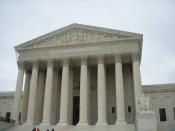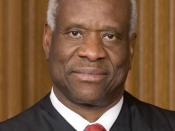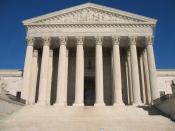The First Amendment The Supreme Court decides on cases in the best interest of the national public. They will sometimes decide differently on very similar cases, because of current happenings around the world. For example, during wartime, the Supreme Court will change the Freedom of Speech laws. If you go against the war effort then the Freedom of Speech laws won?t protect you. There are many instances where the Supreme Court has to rule in the best interest of the public.
The Supreme Court Case, Debs v. United States (1919), was a first amendment case. Eugene Debs, who was a well-known socialist, gave a speech to a crowd of people on Canton, Ohio. His speech was intended to discourage people from joining in the war effort. Debs was arrested and charged with the violation of the Espionage Act of 1917. Lower courts said he was guilty of violating the Espionage Act.
The Supreme Court was to decide whether his 1st Amendment rights were violated. The Supreme Court decided to uphold the lower courts decision. They said he used words that directly went against the United States government. Since it was during wartime, the freedom of speech laws were different.
Schenck v. United States (1919), is a first amendment Supreme Court case. This case deals with the freedom of speech during World War One. Schenck passed out flyers telling people not to join and fight for the war. He was arrested for Espionage. Schenck appealed to the Supreme Court saying that his Freedom of Speech rights were violated. The Supreme Court decided unanimously to uphold the conviction, but for the conspiracy to violate the Espionage Treaty not the actual violation. His speech was not constitutionally protected because he presented a ?clear and present? danger to the United States. The nation was...


